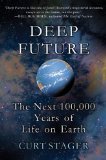
The Next 100,000 Years of Life on Earth
by Curt Stager
In this major new book, paleoclimatologist Curt Stager vividly shows how what we do to the environment in the 21st century will affect the next 100,000 years of life on this planet
Most of us have accepted that our planet is warming and that we’ve played the key role in causing climate change. Yet few of us realize the magnitude of what’s happened. The course we take will affect our civilization and the planet for millennia. What will that world look like? Curt Stager draws on the planet’s geological history to provide a view of where we may be headed. That future is far different from anything anyone has ever seen before.
In the long run, the greatest threat to humans will not be global warming, but global cooling. Just when that “climate whiplash” happens is entirely up to us. We have already put off the next Ice Age, but whether our descendents will see an ice-free Arctic, miles of submerged coasts, or an acidified ocean still remains to be decided. Stager shows how vastly different the world will be if we continue to pollute or if we rein ourselves in for the sake of future generations.
Like the bestsellers The World Without Us and The Next 100 Years, this book offers a new perspective that will change the way climate skeptics, activists, and everyone in between thinks about what we’re doing to our planet.
"Starred Review. A probing exploration of the impact of climate change over geological time...Essential reading." - Kirkus
"Deep Future is a richly informative and deeply persuasive book - one that will be relevant for generations." - Elizabeth Kolbert, author of Field Notes from a Catastrophe
"A highly entertaining, carefully balanced, and deeply sobering look at our climate future." - William F. Ruddiman, author of Plows, Plagues, and Petroleum: How Humans Took Control of Climate
"Fascinating and measured - at last someone is taking the long view." - Mark Lynas, author of Six Degrees: Our Future on a Hotter Planet
"We're short-term thinkers: this fiscal quarter, this presidential term. But as Curt Stager points out in this fascinating, eloquent, and truly novel new account, what we're doing in the short run will have an almost unimaginably long-term effect. Our short moment on earth is changing the planet essentially forever, at least in human terms - which means that this is both a scientifically and ethically crucial book." - Bill McKibben, author of Eaarth
"While most of our attention in the field of climate science has focused on what we might expect by the end of the 21st century, Curt Stager takes us to a time 100,000 years in the future. This intriguing and thought-provoking view of the far future is an essential read for all interested in the full force of climate change. Without thinking outside the box we would have assumed that abrupt climate change was impossible and that human influence on climate could be transparently absorbed by the massive Earth system. Thinking and experimenting outside the box has expanded our climate view horizons and so will Curt Stager’s book." - Paul Andrew Mayewski, Director of the Climate Change Institute, and author of The Ice Chronicles
This information about Deep Future was first featured
in "The BookBrowse Review" - BookBrowse's membership magazine, and in our weekly "Publishing This Week" newsletter. Publication information is for the USA, and (unless stated otherwise) represents the first print edition. The reviews are necessarily limited to those that were available to us ahead of publication. If you are the publisher or author and feel that they do not properly reflect the range of media opinion now available, send us a message with the mainstream reviews that you would like to see added.
Any "Author Information" displayed below reflects the author's biography at the time this particular book was published.
Curt Stager is an ecologist, paleoclimatologist, and science writer with a Ph.D. in biology and geology from Duke University. He has published over three dozen climate and ecology-related articles in major journals including Science and Quaternary Research, and has written for popular audiences in periodicals such as National Geographic. He teaches at Paul Smith’s College in the Adirondack Mountains of upstate New York, and holds a research associate post at the University of Maine’s Climate Change Institute, where he investigates the long-term history of climate in Africa, South America, and the polar regions.
Your guide toexceptional books
BookBrowse seeks out and recommends the best in contemporary fiction and nonfiction—books that not only engage and entertain but also deepen our understanding of ourselves and the world around us.